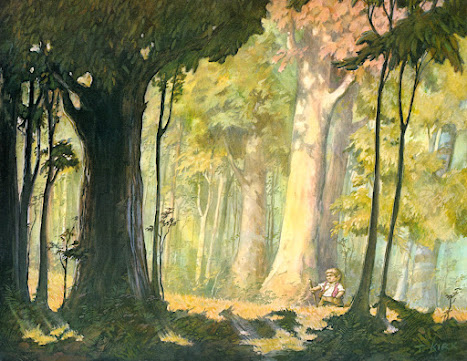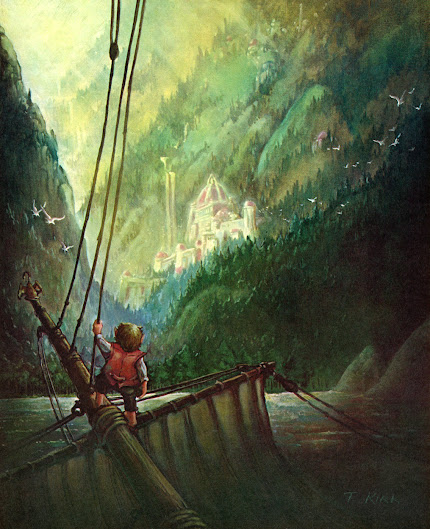The first official Middle-earth calendar by an artist other than J.R.R. Tolkien himself was Tim Kirk's 1975 one published by Ballantine Books. I first encountered Tim Kirk through his great maps and illustrations in the Robert E. Howard paperbacks from the seventies. I only learned from Thomas Parker's Blackgate article about the calendar that the calendar's art started as Kirk's master's thesis.
Kirk ended up a senior artist at Disney, working on rides, resorts, and marketing. It's his early fantasy art, though, that I like and imagine is what he'll be best remembered for. Here are his Tolkien calendar illustrations with quotes from The Hobbit and The Lord of the Rings.
Then Smaug really did laugh -- a devastating sound which shook Bilbo to the floor, while far up in the tunnel the dwarves huddled together and imagined that the hobbit had come to a sudden and nast end.
"You ask first," he said, because he had not had time to think of a riddle.So Gollum hissed:What has roots as nobody sees,Is taller than trees,Up, up it goes,And yet it never grows?
Before long, so great was his speed, they could see him as a spark of fire rushing towards them and growing ever huger and more bright, and not the most foolish doubted that the prophecies had gone rather wrong.
Frodo did not answer at once. Then he spoke slowly. "I know that haste is needed, yet I cannot choose. The burden is heavy. Give me an hour longer, and I will speak. Let me be alone!"
They went along the lane, until they saw the thatched roofs of a large house and farm-buildings peeping out among the trees ahead. The Maggots, and the Puddifoots of Stock, and most of the inhabitants of the Marish, were house-dwellers; and this farm was stoutly built of brick and had a high wall all around it. There was a wide wooden gate opening out of the wall into the lane.
Pippin felt curiously attracted by the well. While the others were unrolling blankets and making beds against the walls of the chamber, as far as possible from the hole in the floor, he crept to the edge and peered over. A chill air seemed to strike his face, rising from invisible depths. Moved by a sudden impulse he groped for a loose stone, and let it drop. He felt his heart beat many times before there was any sound. Then far below, as if the stone had fallen into deep water in some cavernous place, there came a plunk, very distant, but magnified and repeated in the hollow shaft.
They stooped over the dark water. At first they could see nothing. Then slowly they saw the forms of the encircling mountains mirrored in a profound blue, and the peaks were like plumes of white flame above them; beyond there was a space of sky. There like jewels sunk in the deep shone glinting stars, though sunlight was in the sky above. Of their own stooping forms no shadow could be seen.
'And you, Ring-bearer,' she said, turning to Frodo. 'I come to you last who are not last in my thoughts. For you I have prepared this.' She held up a small crystal phial: it glittered as she moved it, and rays of white light sprang from her hand
The Gate was shut. All night watchmen on the walls heard the rumour of the enemy that roamed outside, burning field and tree, and hewing any man that they found abroad, living or dead. The numbers that had already passed over the River could not be guess in the darkness, but when morning, or its dim shadow, stole over the plain, it was seen that even fear by night had scarcely over-counted them. The plain was dark with their marching companies, and as far as the eyes could strain in the mirk there sprouted, like a could fungus-growth, all about the beleaguered city great camps of tents, black or sombre red.
Presently two orcs came into view. One was clad in ragged brown and was armed with a bow of horn; it was of a small breed, black-skinned, with wide snuffling nostrils: evidently a tracker of some kind. The other was a big fighting-orc, like those of Shagrat's company, bearing the token of the Eye. He also had a bow at his back and carried a short broad-headed spear. As usual they were quarrelling, and being of different breeds they used the Common Speech after their fashion.
The light sprang up again, and there on the brink of the chasm, at the very Crack of Doom, stood Frodo, black against the glare, tense, erect, but still as if he had been turned to stone.
Then Frodo kissed Merry and Pippin, and last of all Sam, and went aboard; and the sails were drawn up, and the wind blew, and slowly the ship slipped away down the long grey firth; and the light of the glass of Galadriel that Frodo bore glimmered and was lost. And the ship went out into the High Sea and passed on into the West, until at last at last on a night of rain Frodo smelled a sweet fragrance on the air and heard the sound of singing that came over the water.












